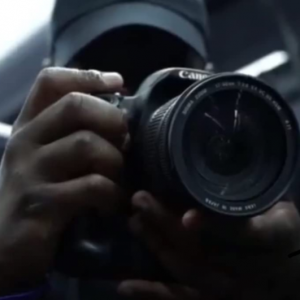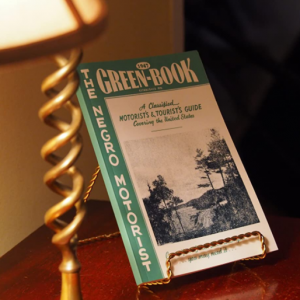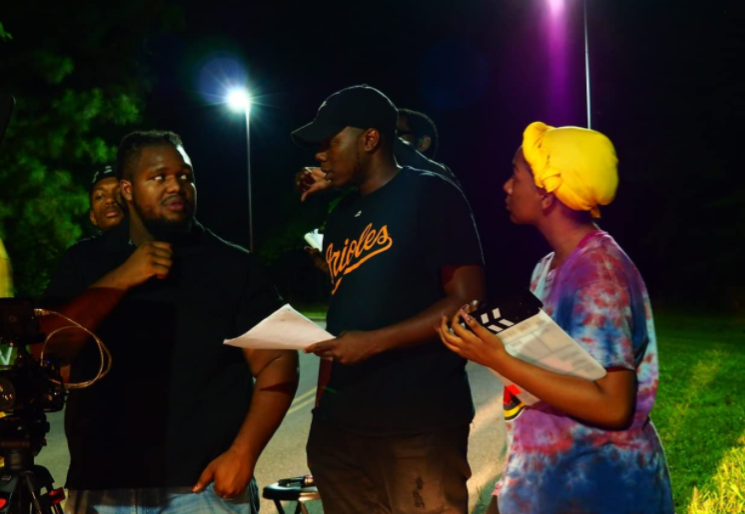Precious Ringor sits down with filmmakers, Justin Smothers and Zacc Goldsmith to talk about their respective pathways to filmmaking and their collaborative work on Grey Town.
 What got you both started with filmmaking?
What got you both started with filmmaking?
Goldsmith: I got into photography in high school. What started as an interest in cameras turned to a passion for films and filmmaking.
Smothers: My background is in general production – that includes television, news, and sports. Once I met Zacc, I was introduced to the world of films and ended up finding a new passion. That’s why I call him a film guru. He showed me a lot of movies I could enjoy, specifically ones that showcase talent from different races as before I was a frequent watcher of specifically Black films because I could relate better with the characters.
Goldsmith: I wouldn’t call myself a film guru. I just loved watching movies growing up. I’ve always found creating movies, the act of putting art onto a screen that people can relate to and enjoy, so inspirational. But since I met Justin, I started getting more into the aspect of how we go about logistically making films. I learned a lot from him in regards to film production.
And how did you two meet?
Smothers: We met at community college in a class where we had to do different video projects. We were inspired by a mutual friend to make all these small clips have one theme. Once we realized the potential of a bigger project, we thought about attempting a short film and that led to Grey Town.
For those who haven’t seen Grey Town, how would you describe it?
Smothers: To take it from Jordan Peele, it’s a social thriller.
Goldsmith: Yes, it’s along the same lines as Get Out and Us. It takes a social issue that’s normally put aside and adds a thriller aspect to it. Those who have seen our film say they can’t believe it’s based on a real story.
Where is that story based from?
Smothers: It’s based on a real experience my grandparents had. Back in the early 70s they were traveling from either Atlanta or Florida – it seems to be debated within my family – back home to Maryland when they were pulled over by a cop. When I asked if they were racially profiled, my grandfather actually admitted to speeding to, in his words, “Get the hell out of there.” Most of the film is true to the story but we did have some twists to make it more interesting. Some things we couldn’t include though because it was a short, like the fact that my dad and uncle, who were small children at the time, were present in the backseat. That was a perspective we would’ve liked to keep

Image of a Green Book from the set of Grey Town.
Was there a particular message you wanted to evoke with your film?
Smothers: The purpose of our film is to educate people about Sundown Towns and the fact that they still exist. In these towns, Black people may be allowed to reside but they have to be indoors at a certain time, usually by sundown. A lot of people seem to forget that segregation in the 60s had real effects on real people. And although we’ve progressed, in reality it hasn’t stopped. We also wanted to teach people about what Green Books are: a Black traveler’s guide to avoiding racist towns that may discriminate against them (i.e. hotels, diners and stores)
We were heading down to work in Texas when we found out about these towns. Originally, we were only going to include my grandparent’s story, but setting it in a Sundown Town just added another element to it. That’s why we called our film Grey Town because it is another term used to reference Sundown Towns.
Did that message stay the same or did it change during production?
Goldsmith: Yes, the message ended up the same as we intended it to be. Making movies is sort of like orchestrating happy accidents – things like laying a song underneath a video that perfectly aligns with the action. It’s what gives a film substance and style. During post production, we found ourselves constantly spotting these happy accidents. Although we had little things we pre-planned that made it into the cut and some things that didn’t work well, there were also lots of times where we felt like everything fell into place.
What was the planning process like for your film?
Goldsmith: It’s interesting because pre-production took three years. We started flushing out the film while we were still at community college and we were initially just filming with a couple of friends. Fortunately, Angela Mathis (our producer) saw how hard we were at work and offered to help out. As she is currently the Program Director for Prince George’s Community College TV (PGCC TV) and a former producer at BET. To have someone established in the industry complement your work and offer to invest gave us that big boost of confidence we needed to push ourselves. Once we had a budget, we had to basically scrap everything and restart from the top. Because now it’s not just a passion project. Now we’re filming for actual producers, using real actors, and buying better gear. This is our first film together and she believed in us enough to help us in our next one as well.
What will your next project be about?
Smothers: Our next project is called BRASS and it’s about a young boxer finding himself right after college, trying to fight life and survive everything around him. It also talks about what it means to be a young Black man and the mental challenges that entails. We got inspired by the idea that most college students don’t know what to do after graduating. They tell you to get a degree but they don’t mention the student debt or how you’re not able to work in the career you want because of lack of experience.
Where are you in terms of film production?
Smothers: Brass is currently nearing the end of its production. It features some very skilled actors based out of the DMV (D.C., Maryland and Virginia) area such as Gavin Peppers, Shawn Durham, and Jeffrey Ford. Along with writing, I am again directing and producing this project as well. Angela Mathis and her company, Student Success Media (S2M), are again producing this film as well.
In comparison to Grey Town, which only hosted five shoot days, we are currently going on the third month of production for Brass. This lengthy schedule is new to me but is nothing more than an exciting challenge that I am eager to conquer. All in all, as my second film, Brass has had its stressful moments. But I know when the martini shot is done and the last edit is made I will be excited to start the journey all over again.

Goldsmith and Smothers on the set of Grey Town.
Do you have any advice for anyone starting out as a filmmaker?
Smothers: I feel that confidence is something I often struggle with and other filmmakers I’ve talked to can agree as well. If you’re considering making films or having issues with the one you’re working on, understand that it will be okay. What you’re doing is special. Even if it may seem like a lot of people are making films, in reality there’s not many who go beyond writing a script. You must believe in yourself and your project. If you want to make films, make films to learn. Even if you don’t hit the mark this time, at least you’ve tried and now you can learn from your mistakes. Understand that you will fail, that’s something you just have to accept if you want to survive this industry and there’s nothing wrong with that. If you’re able to learn from your failures, then it wasn’t a failure in the first place. It’s a lesson.
Goldsmith: I second everything Justin said. Filmmaking involves the art of problem solving; it’s never a smooth experience and it needs a lot of work. When you run into a problem, you can’t stop there because it’s always about the project and nothing else. I would also like to add that collaboration is key. Of course, you can make films by yourself but there’s a certain joy in being able to collaborate with people on a project. It’s a growing experience to work with different types of people because you’re able to expand your horizons and hear other perspectives. So pull whoever you can with you to film. Anyone who is interested in helping, even if they’ve never done it before. Filmmaking takes a lot of grit and teamwork. Make a film not just to say you did, but to learn from mistakes and make better ones in the future.
To watch Grey Town, see https://vimeo.com/408214661 or follow their IMDB page for more info

